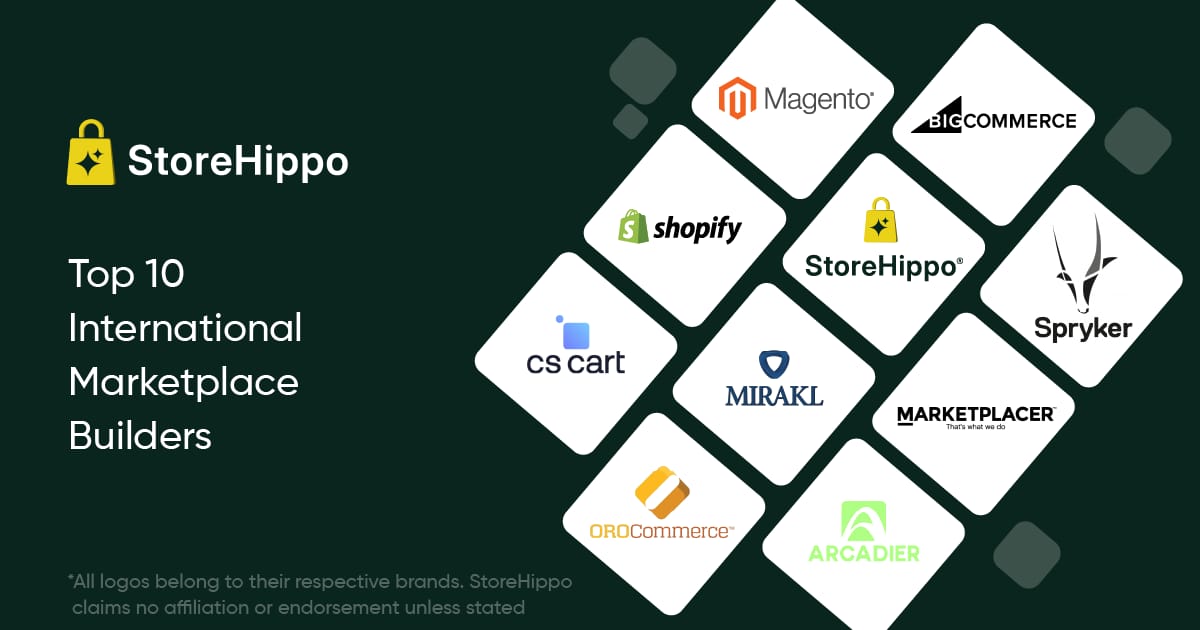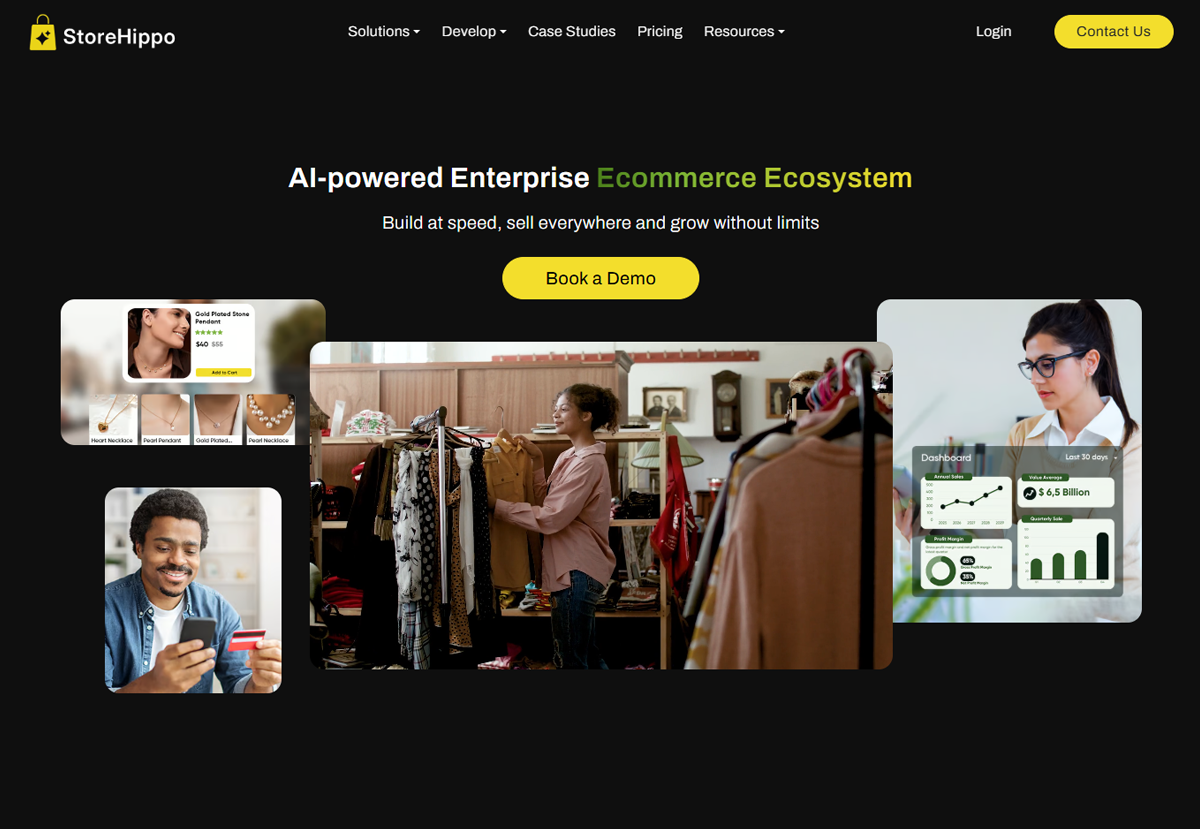Finding the right multi vendor marketplace platform isn’t just about ticking off a checklist; it takes detailed scrutiny and analysis before finalising the best multi vendor marketplace software to help your business grow across borders.
Today’s customers won’t settle for one-size-fits-all marketplaces that ignore their preferences. They expect localized shopping in their own language, seamless payments in local currency, and smooth experiences on any device. To deliver this, enterprises need an international marketplace builder that goes beyond basics and simplifies scaling to new markets.
In this blog, we’ll walk you through the top marketplace builder platforms built to power global multi-vendor success. But before we move to comparisons and analysis, let's first check the data and trends on how buyers are engaging with cross-border marketplaces.
Table of Contents
- Key Trends Shaping International Expansion of Multi Vendor Marketplaces
- Top 10 Multi Vendor Marketplace Platforms for Cross-Border Brands
- 1. StoreHippo – Enterprise-Grade Multi-Vendor Platform for Global Growth
- 2. Adobe Commerce (Magento) + Extensions – Flexible but Developer-Heavy
- 3. BigCommerce – SaaS Multi Vendor Marketplace Platform with Extensions
- 4. Shopify Plus – SaaS Multi Vendor Marketplace Software via Apps
- 5. Mirakl – Enterprise Marketplace for Global Retailers
- 6. Marketplacer – Cloud-Native Multi Vendor Marketplace Platform
- 7.CS-Cart Multi-Vendor – Self-Hosted Marketplace Software
- 8. Spryker – Composable Enterprise Multi Vendor Marketplace Solution
- 9. OroCommerce – B2B-Focused Multi Vendor Marketplace Solution
- 10. Arcadier – SaaS Multi Vendor Marketplace Platform for Quick Launches
- Quick Take On The 5 Best Multi Vendor Marketplace Platforms For Global Expansion
- Conclusion
- FAQ
Key Trends Shaping International Expansion of Multi Vendor Marketplaces
While marketplaces have emerged as the go-to model for attracting buyers worldwide, it’s equally important to understand how customers interact and purchase on cross-border multi-seller platforms.
The following key trends highlight how personalisation and ease of use are driving the global expansion of online marketplaces.
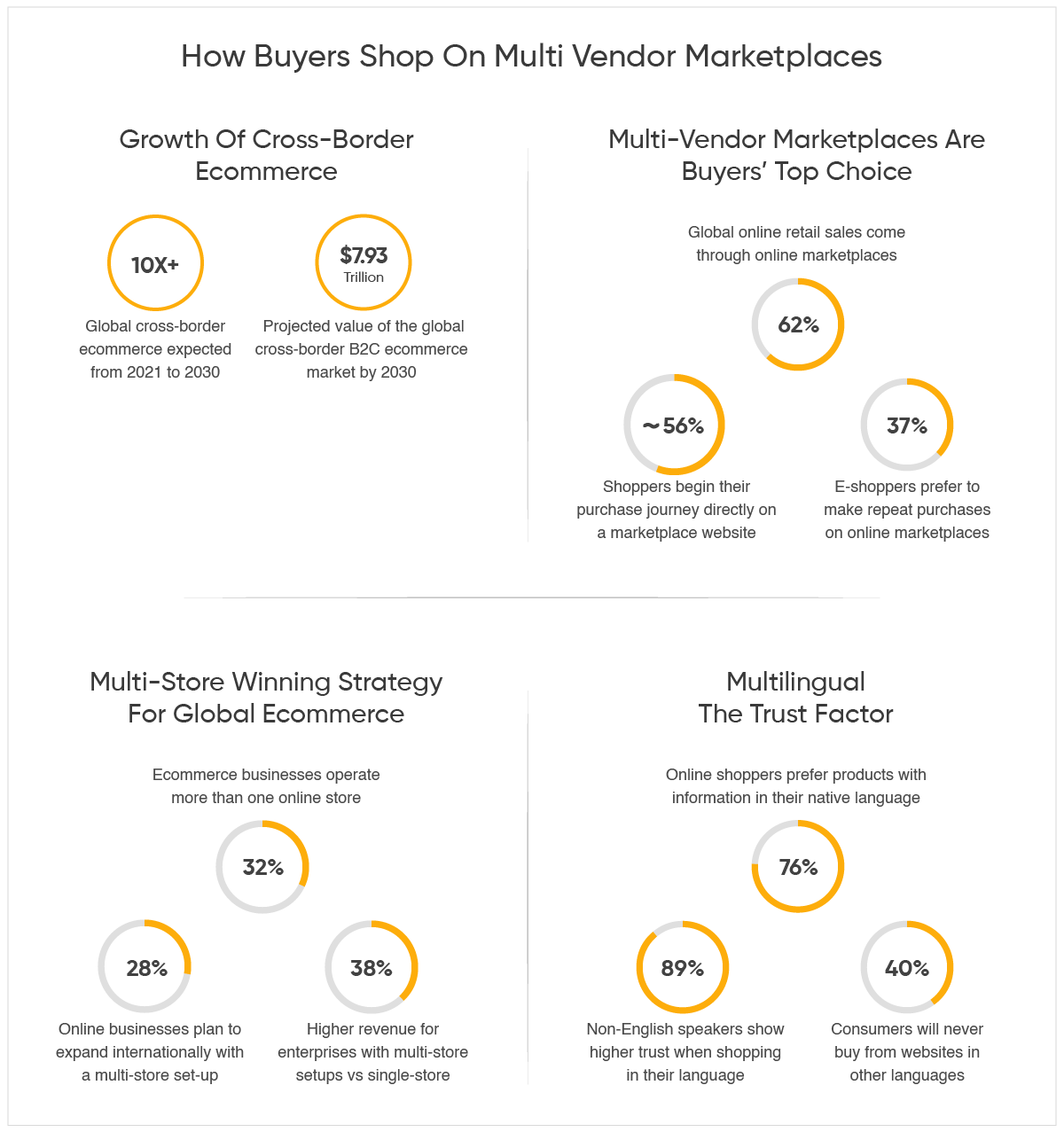
Growth Of Cross-Border Ecommerce
- 10X+ growth in global cross-border ecommerce expected from 2021 to 2030
- $7.93 trillion – projected value of the global cross-border B2C ecommerce market by 2030
Multi-Vendor Marketplaces Are Buyers’ Top Choice
- 62% of global online retail sales come through online marketplaces
- 48-56% of shoppers begin their purchase journey directly on a marketplace website
- 37% of e-shoppers prefer to make repeat purchases on online marketplaces
Multi-Store – Winning Strategy For Global Ecommerce
- 32% of ecommerce businesses operate more than one online store
- 28% of online businesses plan to expand internationally with a multi-store set-up
- 38% higher revenue for enterprises with multi-store setups vs single-store setups
Multilingual – The Trust Factor
- 76% of online shoppers prefer products with information in their native language
- 89% of non-English speakers show higher trust when shopping in their language
- 40% of consumers will never buy from websites in other languages
Source: Statista, McKinsey, Forbes, CSA Research
These numbers make it clear that the buyers trust and return to marketplaces that feel local, seamless, and personalised. For enterprises looking for global expansion, adopting the right multi vendor marketplace platform which helps in implementing these, is the key to unlocking sustainable global growth.
Top 10 Multi Vendor Marketplace Platforms for Cross-Border Brands
Expanding across borders takes more than ambition it needs the right technology behind you.
To make the choice easier, we’ve rounded up 10 of the best multi vendor marketplace platforms built for global brands.
1. StoreHippo – Enterprise-Grade Multi-Vendor Platform for Global Growth
StoreHippo is a future-ready, inherently scalable, fully hosted and managed international marketplace builder designed to simplify cross-border expansion for enterprises of every scale and business model. Positioned as one of the best multi vendor marketplace software solutions for brands across industries, it offers a comprehensive enterprise marketplace solution that supports every marketplace model without relying on third-party plugins. StoreHippo is preferred by enterprises for its ability to build bespoke enterprise ecosystems as per brand requirements.
Key Highlights
- Technology and Architecture: Pure headless, MEAN stack, MACH architecture, composable, AI-native, mobile-first with 300+ built-in features.
- Native Multi-Vendor: End-to-end marketplace management, vendor onboarding, commissions, payouts, catalogues, all built in. No plugins needed.
- Mobile Commerce: Built in mobile apps builder for Android and iOS mobile apps, backend apps for vendors, and admin included out of the box.
- AI Features: Semantic search, product recommendations, multilingual AI assistant, automated cataloguing from product image, image enhancer.
- Customisation and Integrations: No-code tools for speed; APIs for advanced global multi vendor marketplace workflows and integrations.
- Supports for Other Marketplace Models: Natively supports B2B, B2C, B2B2C, Quick Commerce, hyperlocal multi vendor marketplace and custom multi-store ecosystems.
- Multilingual And Multi-Currency: 100+ languages (including RTL) and real-time currency conversions for global reach.
- Multi-Store for Geographies: Launch localized sub-stores with region-specific catalogues, pricing, and tax rules.
- Tax And Compliance: Multi-level tax engine with editable, compliant invoicing templates, full GST support.
Pros
- Native support for all marketplace models.
- Mobile-first with apps for vendors, buyers, and admins.
- Multi-store, multilingual, and multi-currency natively supported.
- 60+ payment gateways and 30+ logistics integrations.
Cons
- Advanced modules are available only in Enterprise/Platinum plans.
- Teams used to plugin-heavy SaaS may need time to adapt to no plugin platform.
Pricing
- Enterprise Plan- $499+/month
- Platinum Plan - $1999 on a minimum one year term
Best For
Enterprises seeking a future-ready, global marketplace platform that powers every business model- B2B, B2C, B2B2C, quick commerce, hyperlocal, or hybrid, without third-party dependencies.
2. Adobe Commerce (Magento) + Extensions – Flexible but Developer-Heavy
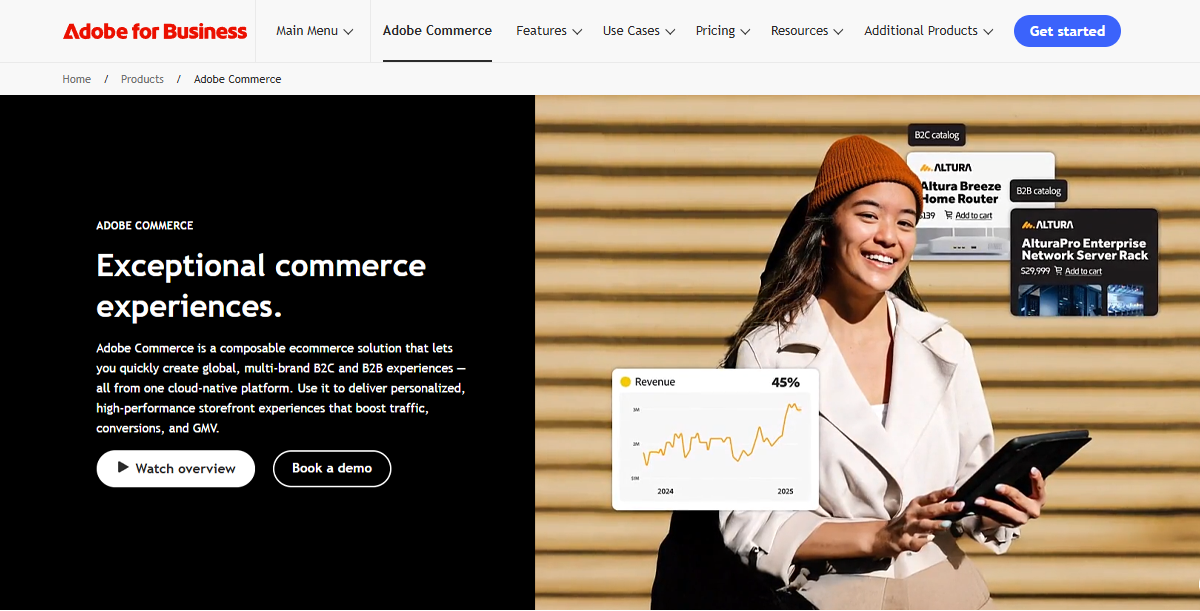
Adobe Commerce, formerly Magento, is a powerful international marketplace builder known for its open-source flexibility and vast ecosystem of extensions. While it does not offer native multi vendor marketplace features, it can be extended with third-party modules to support complex global operations.
Key Highlights
- Technology & Architecture: PHP, MySQL, Elasticsearch. Available in Magento Open Source (free) and Adobe Commerce (enterprise edition).
- Marketplace via Extensions: Requires Webkul, CedCommerce, or other plugins to create a multi vendor marketplace with vendor onboarding, commissions, approvals, and dashboards.
- Mobile Commerce: Responsive storefronts included; marketplace app for buyers, vendor/admin apps generally available through paid extensions.
- AI Tools: Adobe Sensei for AI-driven personalisation, product recommendations, and search. Advanced AI search options also available via third-party integrations like Algolia or Klevu.
- Customisation And Integrations: Open-source flexibility enables deep backend and frontend modifications for tailored enterprise use cases. Extensive integrations supported through APIs.
- Support For Other Models: B2C and B2B supported natively; marketplace and B2B2C require extensions. Hybrid commerce setups possible with heavy customization.
- Multilingual And Multi-Currency: Natively supports multilingual multi vendor marketplace setups with localised catalogs, payments, and checkout flows.
- Multi-Store Capabilities: Run multiple storefronts for different countries, regions, or product lines from one backend.
- Tax And Compliance: Built-in rules for VAT, GST, and region-specific taxes; invoices can be customized for compliance across geographies.
Pros
- Highly customizable open-source base for building global online marketplaces.
- Native support for multilingual, multi-currency, and multi-store rollouts.
- Large global ecosystem of developers and partners.
- Suitable for enterprises needing granular control over global marketplaces.
Cons
- No native marketplace features; depends on third-party extensions.
- High total cost of ownership due to reliance on developers, hosting, and frequent upgrades.
- Security and scalability require strong technical expertise.
- Mobile apps can be build by third party and vendor admin apps only via paid add-ons.
Pricing
- Magento Open Source: Free to download; costs for hosting, extensions, and development apply.
- Adobe Commerce (Enterprise): Starts at $22,000/year, scales with GMV. Marketplace extensions (Webkul, CedCommerce) add extra licensing fees.
Best For
Enterprises with inhouse teams and resources to build a custom international marketplace builder who are willing to invest in ongoing management.
3. BigCommerce – SaaS Multi Vendor Marketplace Platform with Extensions
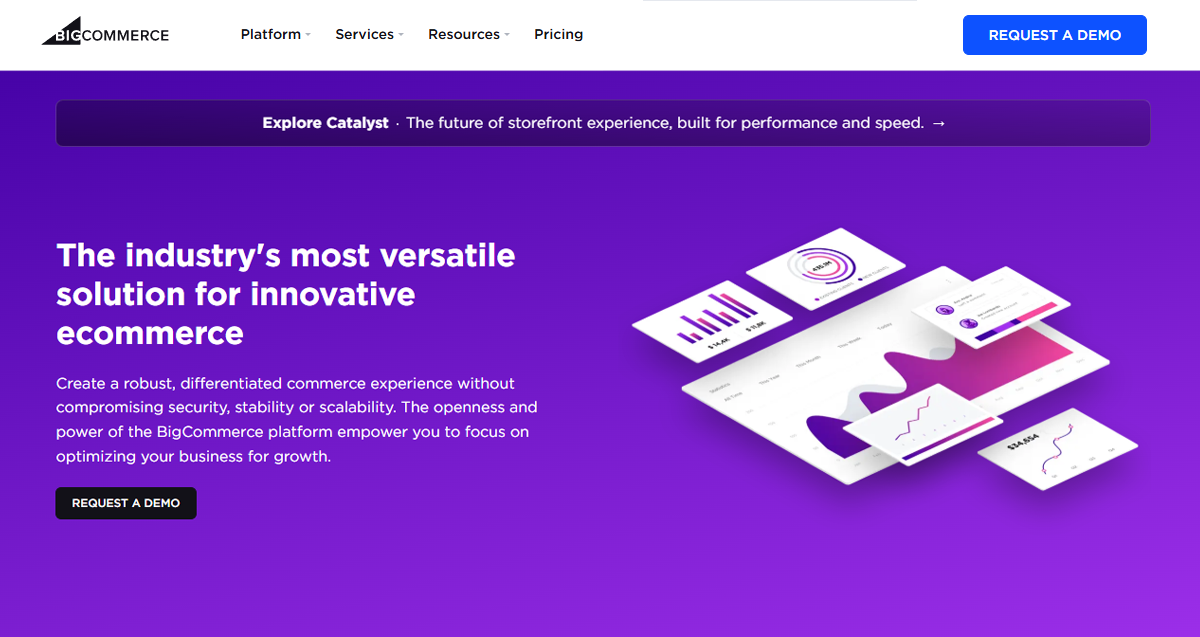
BigCommerce is a cloud-based SaaS multi vendor marketplace platform that enables businesses to scale globally with strong SaaS convenience. While it doesn’t offer native multi vendor marketplace features, it integrates with extensions like Webkul and Marketplacer to create an enterprise multi vendor marketplace solution. The flexible international marketplace builder, works well for enterprises that prefer SaaS simplicity with global reach.
Key Highlights
- Technology and Architecture: Stencil framework, SaaS-based, API-driven with strong app ecosystem.
- Multi-Vendor: No native marketplace; requires extensions like Webkul or Marketplacer for vendor onboarding, commissions, and dashboards.
- Mobile Commerce: Mobile-responsive storefronts included; vendor/admin apps available via third-party providers.
- AI Features: Built-in AI tools for product recommendations and predictive analytics, but availability varies by plan.
- Customisation and Integrations: Strong app marketplace for payments, shipping, ERP, CRM, and marketing. APIs allow deeper custom workflows.
- Supports For Other Marketplace Models: B2C supported natively; B2B and marketplace setups possible with apps/extensions.
- Multilingual and Multi-Currency: Supports multiple currencies natively; multilingual requires third-party apps.
- Multi-Store for Geographies: Multi-storefront feature allows managing multiple stores on the global multi vendor marketplace from one backend, useful for cross-border rollouts.
- Tax and Compliance: Supports Avalara, Vertex, and region-specific tax integrations.
Pros
- SaaS simplicity with strong uptime and scalability.
- Multi-storefront support for international brands.
- Large app ecosystem with ready integrations.
- API-first approach enables flexibility.
Cons
- No native multi vendor marketplace features, paid extensions required.
- Costs increase with store subscription + extensions + add-ons.
- Limited flexibility compared to open-source platforms.
- Multilingual capabilities not native.
Pricing
- Plus Plan: $105/month.
- Pro Plan: $399/month.
- Enterprise Plans: Custom pricing.
- Marketplace extensions (Webkul, Marketplacer) start around $10–$50/month.
Best For
Enterprises ready to build their international marketplace builder with reliable infrastructure and multi-storefront support, but willing to rely on extensions for a complete enterprise multi vendor marketplace solution.
4. Shopify Plus – SaaS Multi Vendor Marketplace Software via Apps
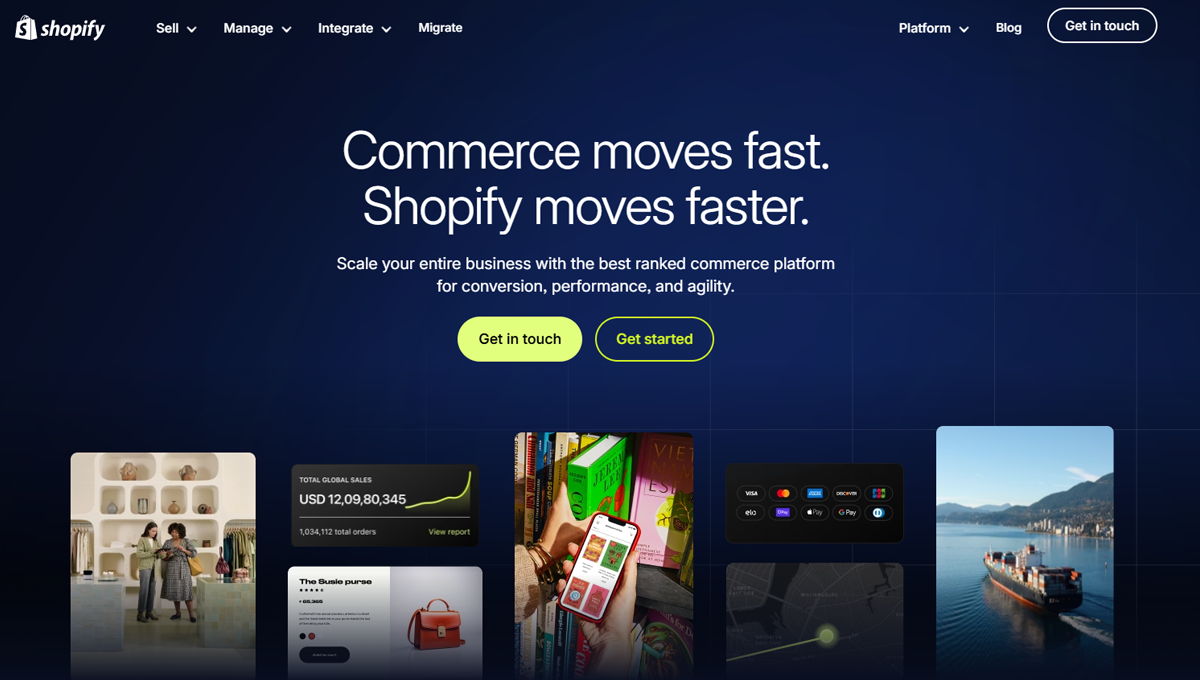
Shopify Plus is a widely used SaaS ecommerce solution that can be extended into a multi vendor marketplace platform using third-party apps like Webkul. While it offers simplicity, scalability, and a strong app ecosystem, it lacks native marketplace features, making it less comprehensive as an enterprise multi vendor marketplace solution compared to platforms built specifically for marketplaces like StoreHippo. For global brands, it serves as an accessible international marketplace builder but requires heavy reliance on add-ons and hence lot of syncs and developer effort.
Key Highlights
- Technology and Architecture: SaaS-based, built on Ruby on Rails with Liquid templating, API-first ecosystem.
- Multi-Vendor Feature: No native support; marketplace features only possible through third-party apps like Webkul.
- Mobile Commerce: Mobile-friendly storefronts included; marketplace buyer, vendor, and admin apps require separate apps from third-party providers.
- AI Features: Basic AI-driven tools for personalisation and marketing; advanced AI search/recommendations require third-party integrations.
- Customisation and Integrations: Extensive app store with 8,000+ integrations for payments, logistics, and marketing. Customization through Liquid templates and APIs.
- Support For Other Marketplace Models: Works for B2C natively; B2B, B2B2C, and multi vendor marketplace setups possible with apps but often fragmented.
- Multilingual and Multi-Currency: Native multi-currency support; multilingual setup needs third-party apps.
- Multi-Store for Geographies: Multi-store setup possible, but requires separate subscriptions, increasing cost and complexity.
- Tax and Compliance: Supports Avalara and region-specific tax rules; limited compared to platforms with built-in tax engines.
Pros
- Easy setup and SaaS simplicity.
- Large ecosystem of apps, themes, and integrations for multi vendor marketplace.
- Strong global payments and shipping support.
- Scalable for fast-growing businesses.
Cons
- No native multi vendor marketplace features.
- Costs escalate quickly with apps and plugins.
- Multi-store and multilingual require workarounds or extra apps.
- Limited flexibility for deep enterprise customizations.
Pricing
- Advanced Shopify: $399/month + app costs for marketplace setup.
- Shopify Plus (Enterprise): Starts at $2,000/month + marketplace apps (Webkul ~$45/month, others additional).
Best For
Enterprises that want a SaaS-based international marketplace builder but are comfortable building their multi vendor marketplace through multiple third-party apps rather than a native, all-in-one solution.
5. Mirakl – Enterprise Marketplace for Global Retailers
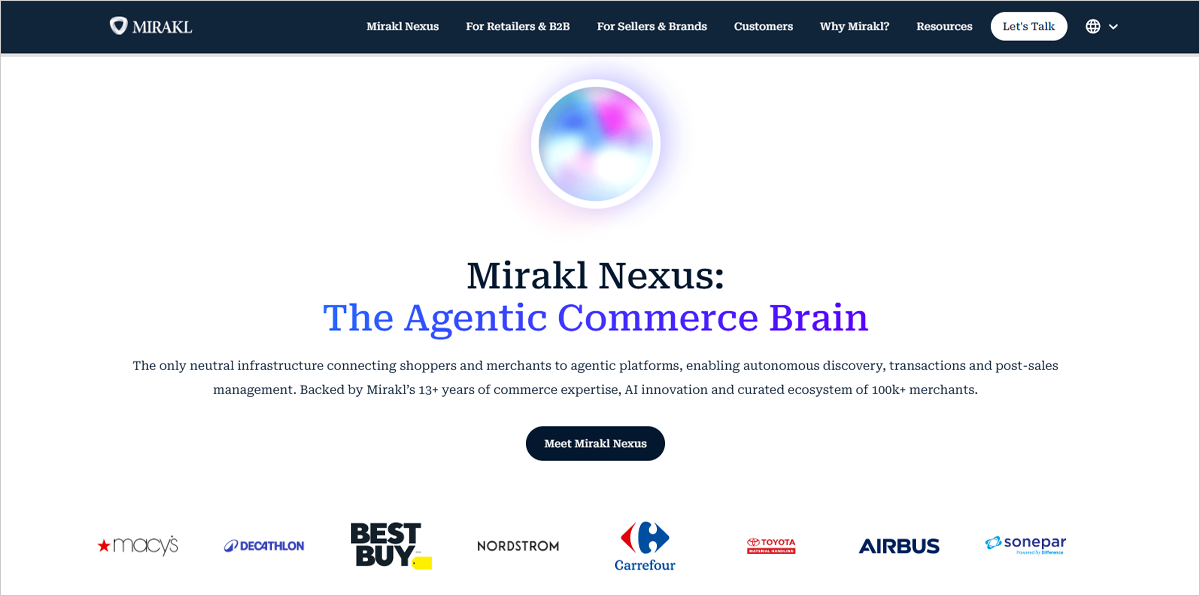
Mirakl is a leading enterprise multi vendor marketplace solution built for large-scale retailers, distributors, and manufacturers. It is known as an international marketplace builder and focuses on scalability, automation, and compliance. Unlike SaaS platforms built for SMBs, Mirakl caters to global enterprises managing complex supply chains and multi-seller ecosystems.
Key Highlights
- Technology and Architecture: Proprietary SaaS platform with enterprise-grade scalability and compliance tools.
- Multi-Vendor: Built specifically as a multi vendor marketplace platform, offering vendor onboarding, catalog sync, commission models, and automated payouts.
- Mobile Commerce: Mobile-ready storefronts are standard; vendor/admin mobile apps can be developed via APIs or partner solutions.
- AI Features: AI-driven product matching, catalog enrichment, and onboarding automation to reduce manual processes.
- Customization and Integrations: APIs and partner ecosystem for ERP, CRM, payments, and logistics. Deep integration with enterprise systems.
- Supports For Other Marketplace Models: Primarily B2C and B2B2C, off-late support for B2B multi vendor marketplaces and vertical-specific use cases.
- Multilingual and Multi-Currency: Fully supports multilingual catalogs and multi-currency transactions for international rollouts.
- Multi-Store for Geographies: Designed for global brands, enabling region-specific catalogs, pricing, and workflows.
- Tax and Compliance: Strong compliance capabilities; integrates with Avalara, Vertex, and other tax engines to handle VAT/GST and cross-border taxation.
Pros
- Enterprise-native, scalable solution for global multi vendor operations.
- AI-powered automation for faster onboarding and catalog management.
- Proven track record with leading global brands.
- Strong partner ecosystem for integrations.
Cons
- High cost of ownership compared to other platforms.
- Long implementation cycles requiring skilled system integrators.
- Vendor/admin mobile apps require custom builds.
Pricing
- Enterprise-focused, pricing available on request. Typically high TCO due to license, integration, and implementation costs.
Best For
Brands looking for international marketplace builder with advanced automation, compliance, and scalability for complex multi vendor marketplace ecosystems.
6. Marketplacer – Cloud-Native Multi Vendor Marketplace Platform
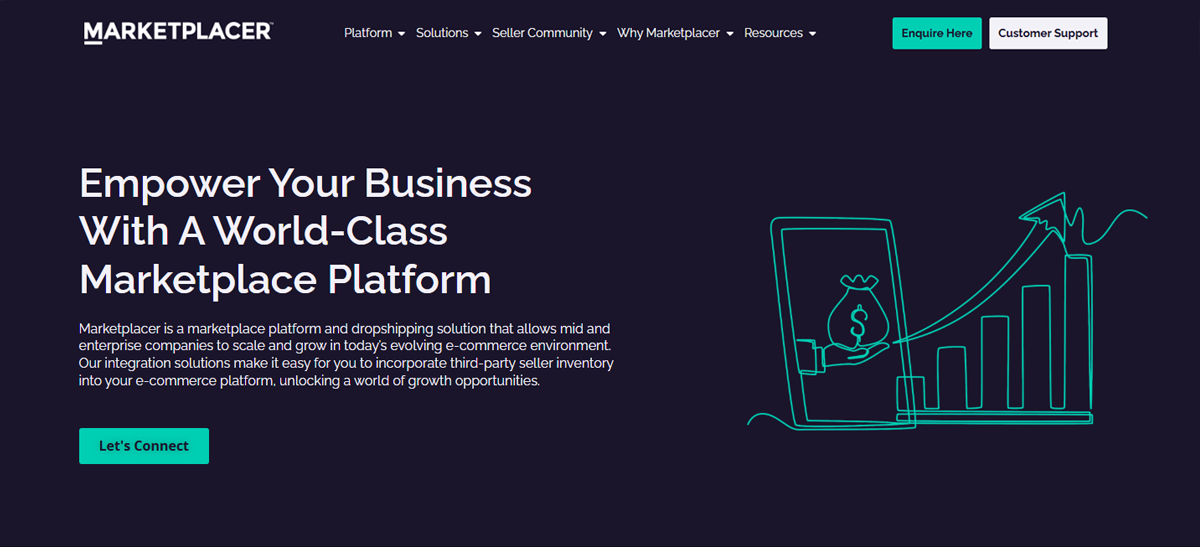
Marketplacer is a SaaS-based multi vendor marketplace platform designed for brands, retailers, and communities looking to expand through marketplaces, dropshipping, or affiliate models. Positioned as an international marketplace builder, it enables businesses to quickly launch and scale, though advanced features often require integrations.
Key Highlights
- Technology and Architecture: Proprietary cloud-native SaaS with modular, API-first design.
- Multi-Vendor: Supports vendor onboarding, commission management, catalogs, and orders. Marketplace features are built-in but often extended through integrations.
- Mobile Commerce: Responsive mobile storefronts included; vendor/admin apps can be developed via APIs or partners.
- AI Features: Limited native AI; personalisation and product recommendations typically require third-party tools.
- Customisation and Integrations: Modular setup with strong APIs; integrates with ERP, CRM, payments, and logistics partners.
- Supports For Other Marketplace Models: B2C and B2B2C supported out of the box, with flexibility for dropshipping and affiliate models.
- Multilingual and Multi-Currency: Multi-currency supported; multilingual support in global marketplace possible but requires configuration or third-party add-ons.
- Multi-Store for Geographies: Allows localised catalogs and storefronts but less robust than platforms purpose-built for global multi-store rollouts.
- Tax and Compliance: Integrates with Avalara and similar tax tools for VAT/GST compliance.
Pros
- SaaS simplicity with modular scalability.
- Out-of-the-box marketplace functionality with dropshipping/affiliate support.
- Strong partner ecosystem for integrations.
- Quick deployment for medium to large enterprises.
Cons
- Limited native AI capabilities.
- Multilingual and advanced multi-store support not as strong as competitors.
- Vendor/admin mobile apps require API-led development.
- Pricing can be high compared to mid-market solutions.
Pricing
- SaaS subscription model; enterprise pricing available on request. Costs vary by scale and integrations required.
Best For
Enterprises or mid-large businesses wanting a SaaS-based international marketplace builder to launch a flexible multi vendor marketplace, particularly those looking to combine marketplaces with dropshipping or affiliate models.
7.CS-Cart Multi-Vendor – Self-Hosted Marketplace Software
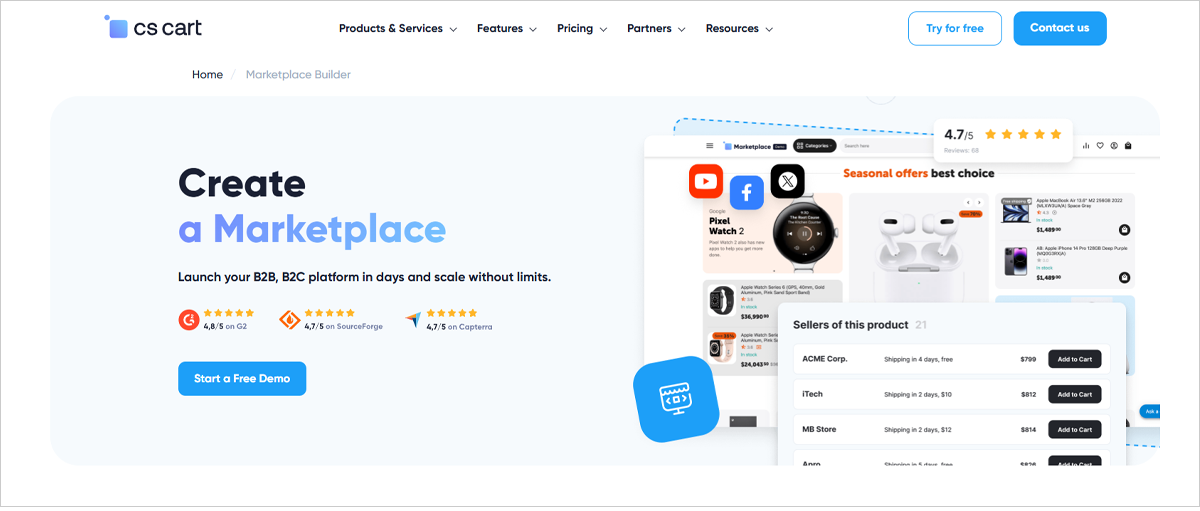
CS-Cart is a popular self-hosted multi vendor marketplace platform that comes with native multi-vendor functionality. It offers an open-source option, enabling enterprises to build a multilingual multi vendor marketplace with strong admin and vendor features. While it is not as plug-and-play as SaaS solutions, it is a reliable international marketplace builder for enterprises with in-house technical expertise.
Key Highlights
- Technology and Architecture: PHP/MySQL based, open-source with both on-premise and cloud options.
- Multi-Vendor: Fully built-in vendor dashboards, onboarding, commissions, catalog, and order management.
- Mobile Commerce: Mobile-ready storefronts; vendor and buyer apps included in higher editions (Plus/Ultimate). Admin apps are limited.
- AI Features: No native AI; personalisation, recommendations, or search enhancements require third-party add-ons.
- Customisation and Integrations: Open-source code allows extensive customisation. Large add-on marketplace for payments, shipping, marketing, and analytics.
- Supports for Other Marketplace Models: Primarily B2C and B2B2C; B2B and hybrid use cases are possible with customisations.
- Multilingual and Multi-Currency: Native support for multiple languages and currencies for cross-border sales.
- Multi-Store for Geographies: Advanced editions allow multiple storefronts with localised catalogs and pricing.
- Tax and Compliance: Built-in VAT/GST support; advanced compliance often requires integrations.
Pros
- Native multi-vendor features.
- Strong multilingual and multi-currency support.
- Vendor dashboards and apps are included in premium editions.
- Flexible open-source architecture for customisation.
Cons
- Requires self-hosting and ongoing technical management to run the multi vendor marketplace platform smoothly.
- Native themes are functional but not very modern.
- AI, personalisation, and advanced features require third-party add-ons.
- Costs increase with add-ons, hosting, and support.
Pricing
- Pro Edition: $155/month with revenue limits.
- Advanced Edition: $295/month, unlimited revenue.
- Multi-Vendor Plus/Ultimate: Higher tiers with vendor apps, common catalogs, and advanced features.
- Additional costs for hosting, add-ons, and support.
Best For
Enterprises or mid-sized businesses that want a customizable enterprise multi vendor marketplace solution with native vendor features and multilingual, multi-currency support, and who have technical resources to manage hosting and upgrades.
8. Spryker – Composable Enterprise Multi Vendor Marketplace Solution
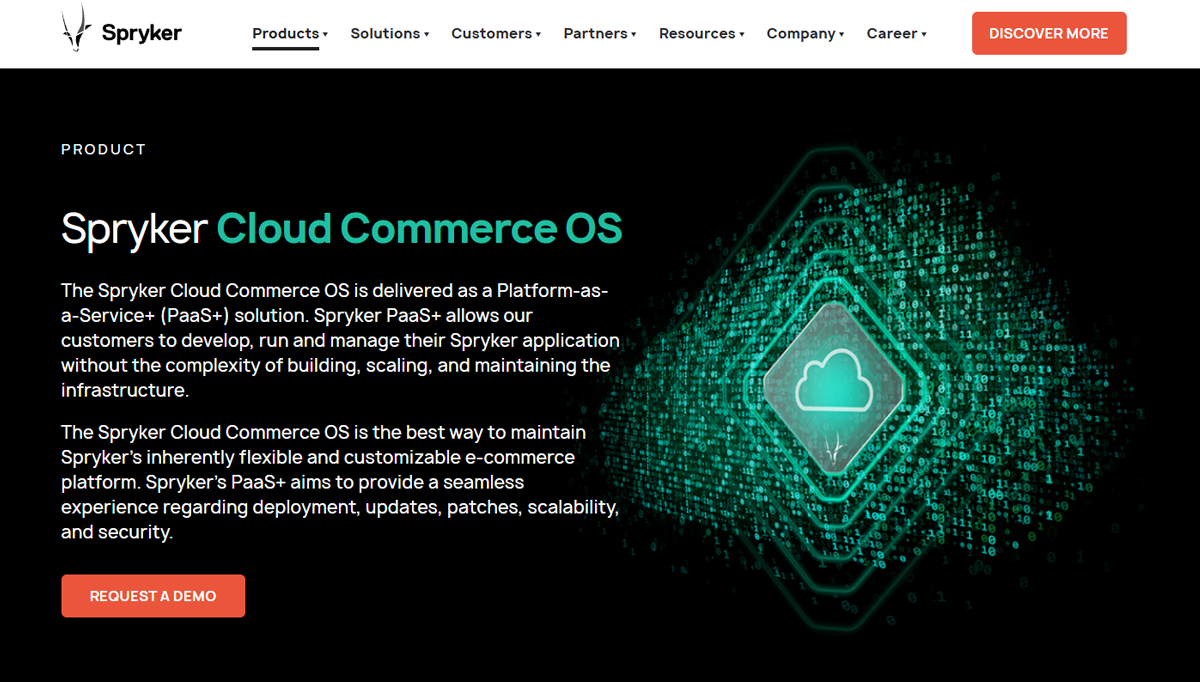
Spryker is a modular, composable commerce platform built for large enterprises with complex digital ecosystems. Positioned as an international marketplace builder, it enables businesses to create tailored multi vendor marketplace platforms for B2B, B2C, or hybrid models. Its flexibility makes it a strong option for enterprises that want full control and are ready to invest in heavy customisation.
Key Highlights
- Technology and Architecture: PHP/Symfony-based, API-first, headless, composable design with Packaged Business Capabilities (PBCs).
- Native Multi-Vendor: Offers built-in marketplace PBCs for vendor onboarding, commissions, and catalog sync. Requires configuration and development for full deployment.
- Mobile Commerce: No ready-made apps; APIs enable enterprises to build custom buyer, vendor, or admin apps.
- AI Features: Leverages partner integrations for AI search, personalisation, and recommendations rather than native tools.
- Customisation and Integrations: Highly composable with APIs; strong integrations with ERP, CRM, logistics, and tax systems.
- Supports For Other Marketplace Models: B2B, B2C, B2B2C, and complex hybrid models are supported with custom configurations.
- Multilingual and Multi-Currency: Native support for multilingual catalogs and multi-currency payments for cross-border rollouts.
- Multi-Store for Geographies: Allows multiple storefronts with localised catalogs, pricing, and workflows across regions.
- Tax and Compliance: Supports VAT/GST through integrations with Avalara, Vertex, and similar providers.
Pros
- Fully composable, enterprise-grade architecture to build global multi vendor marketplaces.
- Supports highly complex B2B and hybrid marketplace models.
- Strong localization with multilingual and multi-currency features.
- Flexible integrations with enterprise IT systems.
Cons
- High cost of ownership and long implementation cycles.
- Requires experienced developers and system integrators.
- No built-in mobile apps; must be custom-developed.
- AI and personalisation depend on partners, not native.
Pricing
- Custom enterprise pricing based on modules and GMV. Typically higher TCO compared to SaaS competitors.
Best For
Large global enterprises needing a composable international marketplace builder to create tailored enterprise multi vendor marketplace solutions with complex workflows and hybrid commerce models.
9. OroCommerce – B2B-Focused Multi Vendor Marketplace Solution
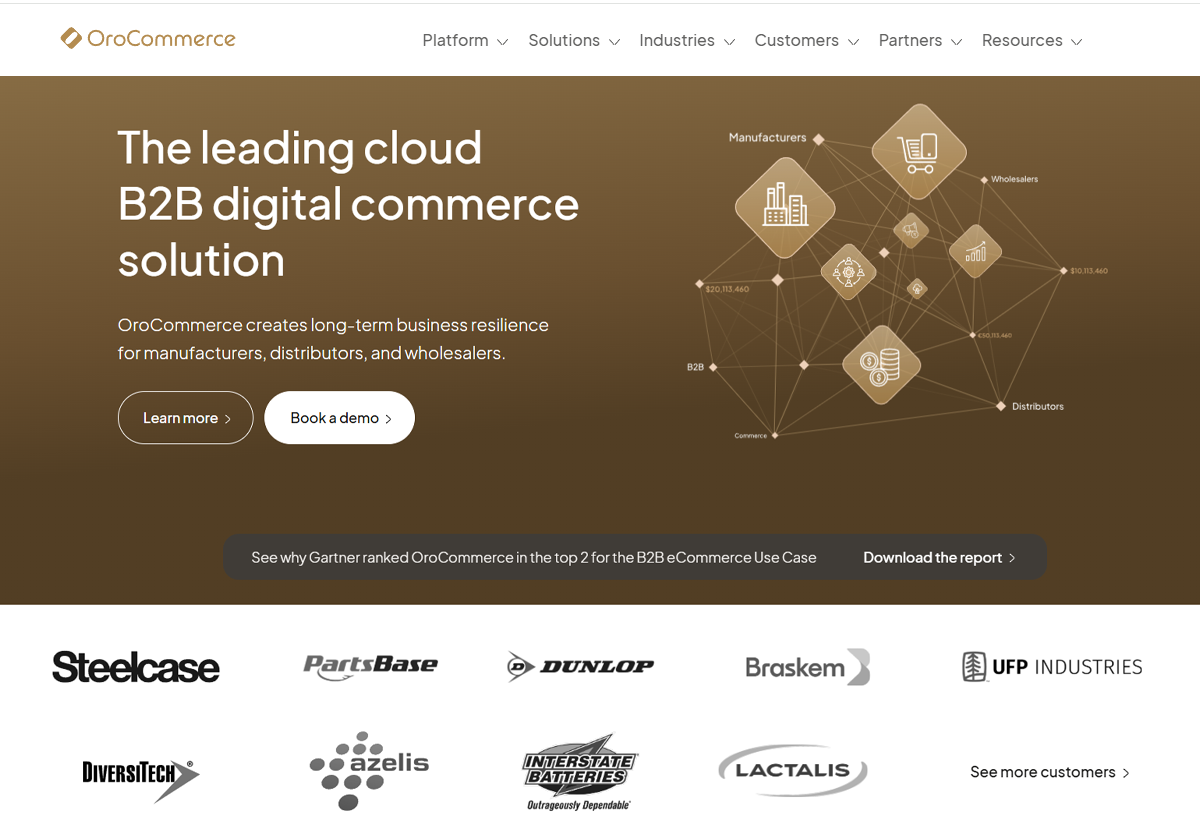
OroCommerce is an open-source platform built on Symfony, designed specifically for complex B2B commerce use cases. With the OroMarketplace extension, it can be turned into a robust multi vendor marketplace platform. Positioned as a flexible international marketplace builder, it offers enterprises strong workflows for procurement, negotiations, and global rollouts, making it one of the best multi vendor marketplace software options for B2B.
Key Highlights
- Technology and Architecture: Symfony-based open-source framework with enterprise edition for advanced features.
- Multi-Vendor: Requires OroMarketplace extension to add vendor onboarding, commissions, catalogs, and dashboards.
- Mobile Commerce: Mobile-ready storefronts; APIs available for building custom buyer, vendor, and admin apps.
- AI Features: Offers personalization and analytics features; advanced AI search and recommendations possible via integrations.
- Customisation and Integrations: Highly customisable open-source base with APIs for ERP, CRM, and procurement systems.
- Support For Other Marketplace Models: B2B natively; can be extended for B2C, B2B2C, and custom marketplaces with development.
- Multilingual and Multi-Currency: Native support for multilingual catalogs and multi-currency checkout.
- Multi-Store for Geographies: Supports multiple stores with localized catalogs, pricing, and tax rules.
- Tax and Compliance: Configurable tax rules with VAT/GST support; integrates with Avalara, Vertex, and regional tax systems.
Pros
- Built specifically for B2B commerce and marketplaces.
- Strong workflows: RFQs, negotiated pricing, custom catalogs.
- Native multilingual and multi-currency support.
- Open-source flexibility for enterprises needing custom solutions.
Cons
- Marketplace features only available via extension.
- Requires experienced developers for setup and scaling.
- Smaller ecosystem compared to Magento or Shopify.
- No native vendor/admin mobile apps.
Pricing
- Community Edition: Free, open-source.
- Enterprise Edition: Custom pricing, typically starting in the mid five figures annually.
- OroMarketplace Extension: Licensed separately; adds to overall TCO.
Best For
Enterprises seeking an enterprise multi vendor marketplace solution tailored for B2B procurement, negotiations, and workflows, and willing to invest in development to create a customized international marketplace builder for global rollouts.
10. Arcadier – SaaS Multi Vendor Marketplace Platform for Quick Launches
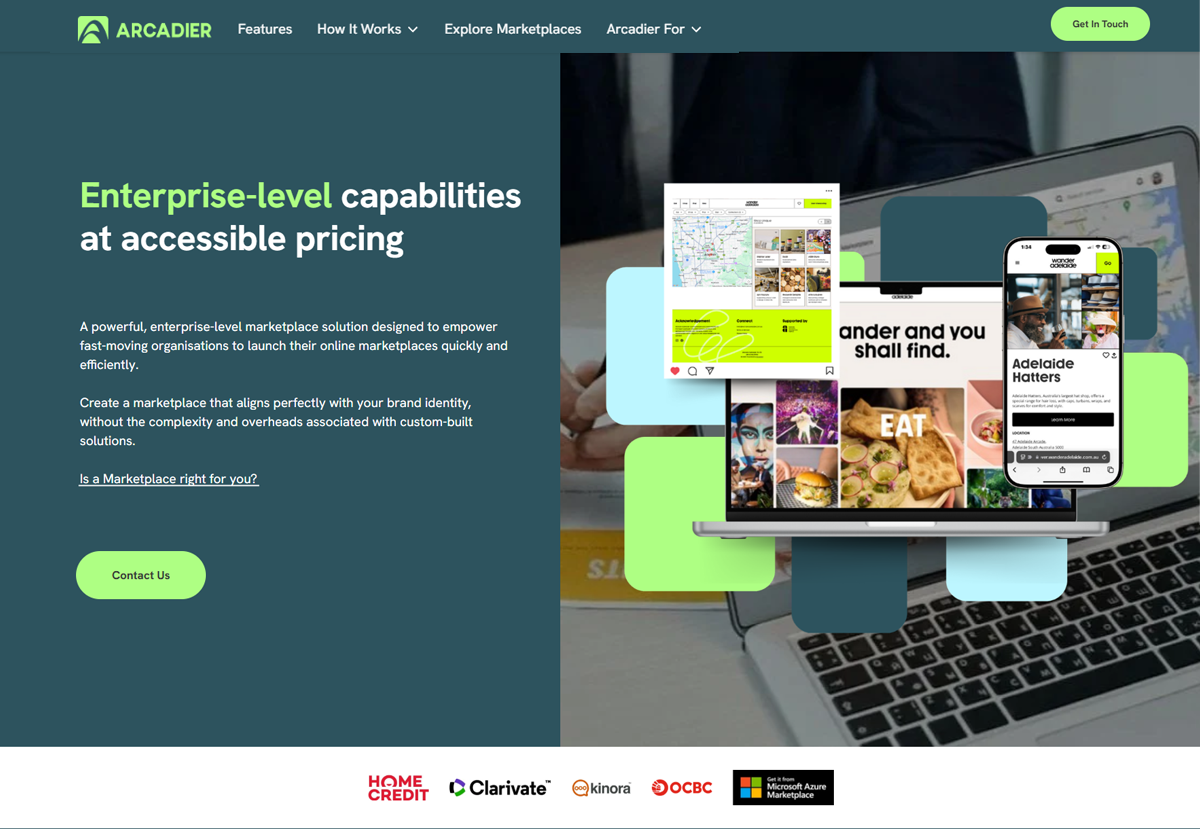
Arcadier is a cloud-based multi vendor marketplace platform that enables businesses to launch marketplaces quickly using industry-specific templates. It is a simple international marketplace builder, best suited for SMBs and mid-sized enterprises that want speed-to-market rather than deep customisation. While not as advanced as the best multi vendor marketplace software, it offers core features for retailers, service providers, and rental marketplaces.
Key Highlights
- Technology and Architecture: Proprietary SaaS platform with ready-made templates for retail, services, and rentals.
- Multi-Vendor: Includes vendor onboarding, dashboards, commission setup, and catalog management out of the box.
- Mobile Commerce: Mobile-responsive storefronts; vendor/admin apps must be custom-developed via APIs.
- AI Features: No native AI; personalisation and recommendations require integrations.
- Customisation and Integrations: Low-code/no-code environment with APIs for payments, shipping, and analytics. Limited flexibility compared to open-source or composable platforms.
- Supports For Other Marketplace Models: Retail, service, and rental marketplaces supported; B2B and hybrid setups possible but basic.
- Multilingual and Multi-Currency: Supports multiple languages and currencies natively for international buyers.
- Multi-Store for Geographies: Can run multiple storefronts for the multi vendor marketplace, but less advanced compared to enterprise-grade platforms.
- Tax and Compliance: Basic tax features built in; advanced VAT/GST compliance requires third-party tools.
Pros
- Fast setup with SaaS simplicity.
- Industry-specific templates reduce time to launch.
- Multilingual and multi-currency supported natively.
- Affordable compared to enterprise marketplace solutions.
Cons
- Limited scalability for large enterprises.
- No native AI or advanced personalisation.
- Vendor/admin mobile apps require custom build.
- Limited flexibility for deep customizations.
Pricing
- SaaS subscription model starting around $79/month.
- Enterprise and white-label solutions available at higher custom pricing.
Best For
SMBs and mid-sized businesses looking for a low-code international marketplace builder that want to avoid the complexity of an enterprise multi vendor marketplace solution.
Quick Take On The 5 Best Multi Vendor Marketplace Platforms For Global Expansion
Here is a quick table to compare the top five marketplace solution providers in the list.
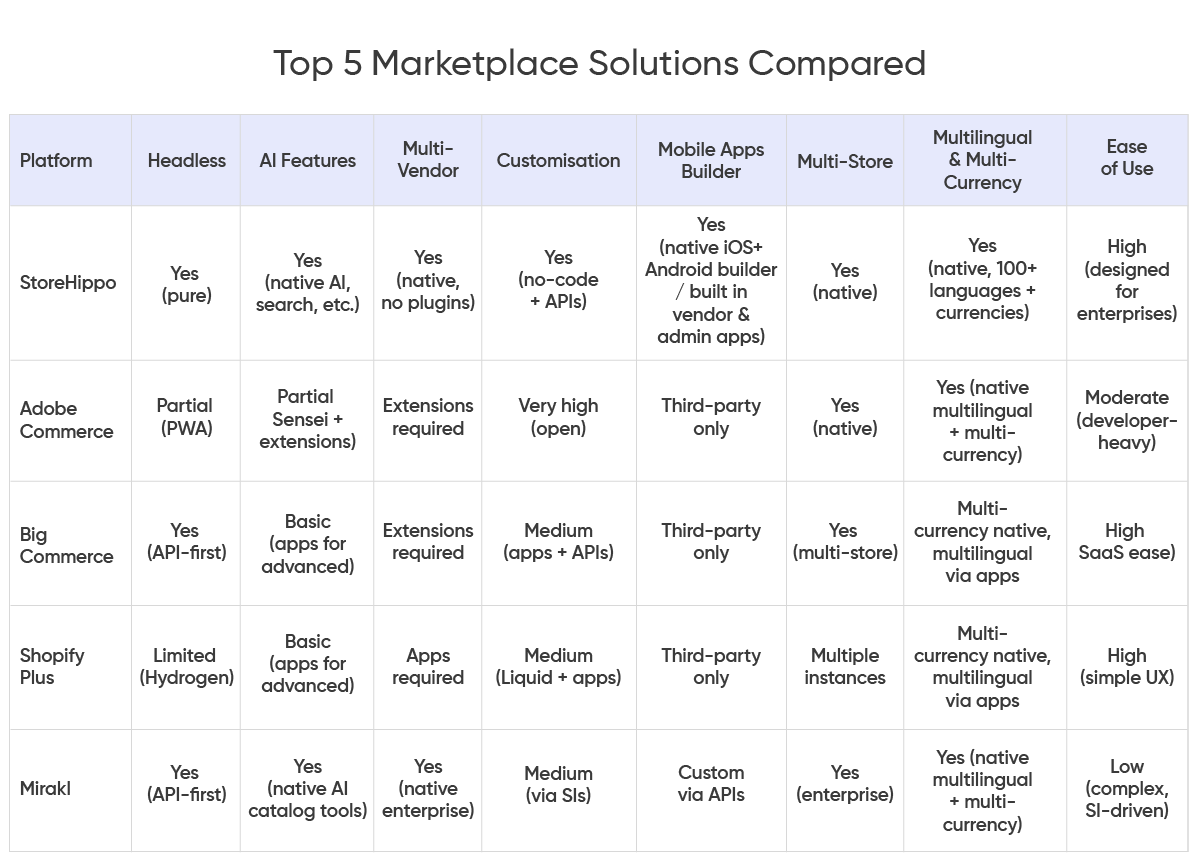
Conclusion
Enterprises aiming for cross-border growth need more than standard SaaS setups or open-source frameworks. The real differentiator lies in a multi vendor marketplace platform that delivers scalability, flexibility, and the agility to design bespoke ecosystems. With multilingual and multi-currency readiness, AI-driven personalization, and mobile-first commerce, the next wave of marketplaces will be those that are intelligent and enterprise-native.
If you’re evaluating the best multi vendor marketplace software for your brand, start with a platform that goes beyond being just an international marketplace builder. Look for one that offers a complete enterprise multi vendor marketplace solution, native multi-vendor features, AI capabilities, and the freedom to support every model from B2B and B2C to quick commerce and hyperlocal. Try it as your first option, and you’ll see how future-ready marketplaces are built.
If you’re evaluating the best multi vendor marketplace software for your brand, start with a platform that goes beyond being just an international marketplace builder. Look for one that offers a complete enterprise multi vendor marketplace solution, native multi-vendor features, AI capabilities, and the freedom to support every model from B2B and B2C to quick commerce and hyperlocal.
Ready for your marketplace brand’s global expansion?
Choose the best multi vendor marketplace platform by trying each of them, begin right away with the very first one in the list- StoreHippo. Book a free demo now.
Ultimately, the right choice depends on your business goals, technical resources, and global expansion strategy. But with the right platform, your marketplace can evolve from a regional presence into a truly global brand.
FAQ
1. Why is a native multi vendor marketplace better for cross-border business than one built on plugins?
A native multi vendor marketplace is far better suited for cross-border growth than one built on plugins. While plugin-based platforms offer quick fixes, they often lead to conflicts, slower performance, and high maintenance as your business expands globally.
In contrast, a built-in multi vendor solution runs on a unified core, ensuring faster speed, seamless scalability, and effortless upgrades without plugin chaos. It’s also more cost effective as you don’t have to pay for multiple third party plugins and sync them with help of experienced dev team or service providers. StoreHippo, offers a zero plugin enterprise multi vendor marketplace solution for smooth international expansion, multilingual marketplace website, and multi-currency transactions, all without third-party dependencies.
2. How easy is it to scale a multi vendor marketplace when planning to go live in multiple countries at the same time?
Scaling a marketplace across regions depends on how quickly you can localise storefronts, set up currencies, taxes, and logistics, all while keeping performance steady. Platforms that require separate setups or heavy development for each market and region specific marketplace sub-store, slow down your go-to-market (GTM) timeline and increase operational costs.
A truly scalable marketplace platform like StoreHippo simplifies multi-country expansion with its cloud-native architecture, built-in multi-store capabilities, and global commerce support. Equipped with multilingual, multi-currency, and marketplace-ready features, it enables enterprises to launch fully localized marketplaces across regions quickly and with minimal technical effort. This built-in scalability ensures smoother expansion, lower GTM time, and easier management as your brand grows globally.
3. Do multi vendor marketplace platforms need plugins to support multilingual content, localised product catalogues, and checkout for different regions?
Many multi vendor platforms rely on plugins or third-party apps to add multilingual content, regional catalogues, and localised checkout options. While this may work initially, it often leads to version mismatches, higher costs, and limited control as you expand globally.
With StoreHippo global multi vendor marketplace platform, everything is built in. Its sub-store feature lets you create localised storefronts with unique URLs, design, catalogues, for each country or region, while the master catalogue ensures centralised control over products, pricing, and inventory. You can easily manage multilingual content, local currencies, and region-specific taxes and checkouts without any external plugins, making cross-border expansion faster and more reliable.
4. What makes AI-powered multi vendor marketplace platforms better than legacy platforms?
AI-powered platforms go beyond automation they learn from buyer behaviour, predict demand, and personalise experiences in real time. Unlike legacy systems that rely on manual workflows and static rules, AI-driven marketplaces can automate cataloguing, recommend products, optimise search results, and even assist buyers through conversational interfaces.
With built-in AI tools like semantic search and recommendations, automated catalogue creation, image enhancement, and agentic AI shopping assistants, StoreHippo helps enterprises make smarter decisions, boost conversions, and scale globally faster, without the performance and integration limitations of legacy platforms.
5. What’s better for a growing brand, open-source multi vendor software or a SaaS-based global marketplace builder?
Open-source multi vendor software gives flexibility to build custom features, but comes with high setup, maintenance, and upgrade costs. Each new integration or localisation often requires developer time, slowing your ability to scale globally.
A SaaS-based global marketplace builder offers faster setup, built-in scalability, security, and automatic updates, so brands can focus on growth rather than upkeep. StoreHippo, for instance, delivers enterprise-grade SaaS convenience with full flexibility through its headless and composable architecture, helping growing brands expand faster without technical overhead.
6. Can a multi vendor marketplace platform handle B2B and hyperlocal B2C selling together?
Yes, but only a few advanced multi vendor marketplace platforms are built to support both models seamlessly. Most traditional systems struggle to combine bulk B2B workflows like custom pricing, RFQs, and credit limits with hyperlocal B2C needs such as location-based listings, quick deliveries, and nearby vendor discovery.
StoreHippo natively supports B2B, B2C, D2C, and hyperlocal marketplaces from a single backend. Its flexible architecture lets enterprises manage both wholesale and local retail operations together with unified inventory, dynamic pricing, and geo-based storefronts, all without relying on external plugins.
7. How do multi vendor marketplace platforms like StoreHippo ensure long-term scalability and future upgrades without replatforming?
Long-term scalability depends on how modern and flexible a platform’s core architecture is. Traditional systems often need replatforming every few years as technology, buyer behaviour, and business models evolve.
StoreHippo eliminates this problem with its microservices based, cloud-native, headless, and composable architecture. It automatically scales to handle higher traffic, global rollouts, and new business models all while receiving zero-downtime updates. This means enterprises can keep innovating and expanding without ever needing to rebuild or migrate their platform again.
